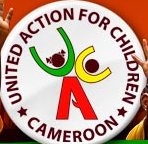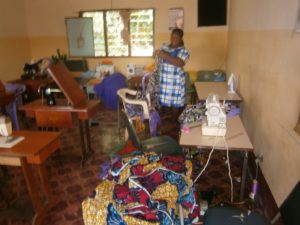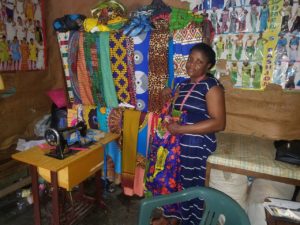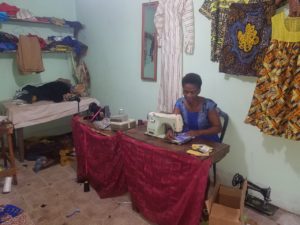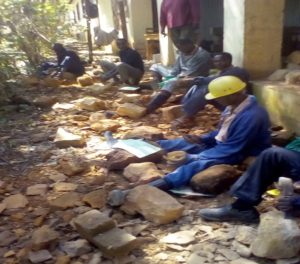 |
|---|
Progress and Peace in Uganda
By Patricia Hamill
Spring 2018
In July of 2017, Sewing Peace sent 73 refurbished sewing machines to the Mityana Open Troop Foundation (MOTF) & Vocational Project for their tailoring and designing workshops. The relationship with MOTF is a promising one and steadily growing. After the delivery, we were soon notified that these machines were put right to use and helped a number of participants earn their certificates of completion in the two-year program. Start-up machines were presented to graduates so they could move on to business ownership or employment in tailoring and sewing.
Participants, predominantly young men and women between 13 and 25 years old, are often those who have been orphaned young and have no family to depend on or those whose families cannot afford their education. Some teenagers are already parents themselves. Lack of job skills is inevitably a consequence of these factors as they have faced severe financial and social boundaries that prevent them from becoming independent earners. But with the continued availability of the vocational workshops and machines, the success rate grows and more of these people can reverse or mend their monetary dilemmas.
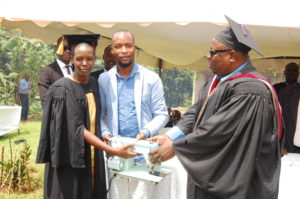
The vocational program does offer other courses such as hairdressing and hair weaves, carpentry and joinery, auto mechanics, agriculture, and animal husbandry, but the sewing courses are especially in demand. In July, the ratio of machines to people was 1:4, sometimes 1:5. With the additional machines, the current ratio of machine to participant in the workshops is now 1:3. According to Matthew Yawe, the Executive Director of Mityana Open Troop Foundation & Vocation Project and the country representative for Pedals For Progress/Sewing Peace in Uganda, a recent graduation ceremony that included the presentation of the sewing machines to the trainees who had completed their program “enticed and attracted more trainees from all the surrounding areas and they also brought in their children to study.” Many hope to join and to graduate with “nice sewing machines from [the] project.” The sewing department, last year, had a population of 30 trainees; this year, there was an increase to 45.
The sewing program has set up a shop in their town from which they sell some of the machines. The income enables them to pay the instructors and meet the shipping and customs costs.
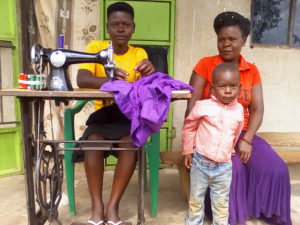
One of the graduates of 2017, Resty Masane, put her new sewing machine to work on the veranda of her parents’ home in Nalyankanja, an area about 18km (11 miles) from Mityana. This 20 year old joined the vocational project in 2015. She had completed her “primary seven,” which is the last of seven years of academic study before students move on to six years of secondary schooling, but her parents did not have enough money to send her for this next stage of studies. Her parents are farmers who manage to grow enough for home consumption and have just a little left to sell or trade in order to buy other requirements. In fact, Resty’s parents paid her sewing program fees by bartering beans—a reliable crop in their climate—and maize for her vocational studies. Something of value exchanged for something of value: It’s a win-win arrangement.
Resty’s contracts include making uniforms for a village secondary school and two village primary schools. She earns between 10,000 and 15,000 Ugandan shillings (approximately U.S. $2.65 to $4.00) Since she can make 3–5 uniforms a week and also do repairs for a fee, she has an income that is reliable and a skill that will remain in demand. To add to her success, she now pays school fees for her five siblings. Resty also puts the barter system to good use by providing some uniforms to a sister’s school in lieu of paying fees. Her income also helps defray the cost of medication for her family and enables her to maintain a phone, which of course lets her stay in touch with clients and schools.
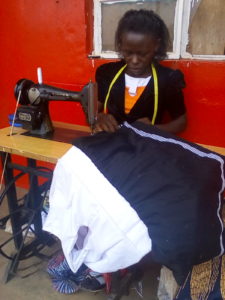
Also in 2017, Ereth Nampijja, a 21-year-old woman, graduated after taking a tailoring and fashion design course. She lives in Busunju-Mityana, located 30km (about 19 miles) from Mityana. She had been a good student, moving from primary school to completing her O levels—the exams taken after the first 4 years of secondary school—but her family could not afford to send her for the critical last two years. As a result, she could not sit for the A levels (final exams) or graduate. It was then that she approached MOTF to participate in the vocational program. Two years later, Ereth’s ambition and effort cumulated in a certificate of completion and, with what help her parents could offer, she now has a three-month lease of a space in the market where she can repair or repurpose second-hand clothes to sell from her shop or via mobile vendors who take the goods to the rural villages to sell.
Ereth averages about 7,000 Ugandan shillings (approximately $1.85) per day. This newfound financial independence allows her to rent a room near her shop and provides her with daily meals. Like Resty, she can provide funds for medication and cover school fees for her brothers and sisters. Her goals are to grow her business and to have more room to store her machine and finished products safely from the elements.
As this article was being finalized, we heard from Matthew that the recent shipment of 64 more machines reached MOTF and were being made ready for the next class session. The heavy-duty machines especially pleased him because the orders for school uniforms can also be completed with the institutions’ embroidered emblems and garments made from heavy fabrics can also be made and mended as part of the graduates’ added services offered.
As is to be expected, there are ongoing challenges for the program. These, however, are a result of the progress it has made. This growth in enrollment means that the existing workshop is at maximum capacity and the instructors often have to create shelters outside under the trees where they set up the sewing machines for classes. With the better part of six months of the year bringing substantial rainfall, this makeshift environment is not a viable long-term option. MOTF is, as always, looking to the future and plans to be able to reinvest in and improve their facilities as they continue to sell machines and bicycles from Pedals for Progress. The record of success stories can only continue to expand from here.
President’s Message, Spring 2018
These are exciting times at P4P. There have been a lot of extremely positive developments since we wrote the last newsletter, concerning our past, our present, and our future.
Let’s first do the past. You know that we develop long-term partnerships with the organizations overseas that distribute our bicycles. Our oldest project — started in 1992 in Rivas, Nicaragua — created our model that we have duplicated around the world. It’s time to end the project!
We have shipped 25,569 bikes into Rivas and 42,879 to Nicaragua as a whole. It’s time to move on. The economy in Nicaragua is very bad right now but the people of Rivas have mobility; the town is saturated with bikes. Rivas has moved from a walking city to a mechanized city; our work there is done.
When we started in Rivas the average child completed four years of school. Today because they all have bicycles and can get to school do their studies and get home in time to do their chores, the average child completes high school. It was all done on bicycles donated by you.
There have been a couple of documentaries on the success of the city; the most notable is “The Bicycle City” by Greg Sucharew. (Click here for a one-minute trailer.)
While Rivas is a tremendous success I am sad because I have interacted with the people of this community for over 25 years and I will always consider Wilfredo Santana my brother. But ending the Rivas program will allow P4P to ship to other places currently in greater need.
Next we move on to the present. During the economic slowdown and for the first two years of our nation’s economic recovery, bicycle sales were down, which meant that many fewer people were buying new bikes and donating their old bikes to P4P. Our production fell to a low in 2016 that it not been seen since the very first days of the organization in the early 1990s. This has changed!
National bicycle sales are improving, which means we are getting more bikes per collection and there are more groups wanting to run collections. We are still looking for collections in new communities, but production is up.
This increased production, along with the bikes we will no longer ship to Rivas, adds up to a lot of containers needing a destination.
And this brings us to the future. We have not added a new bicycle program since 2011. Our active partners have gobbled up all of the containers we had to ship in the slow years, and our first goal is to resupply existing partners. But now we have enough bikes to add multiple new bicycle programs. This is exciting work. It is also extremely labor-intensive and can be costly.
Any new venture requires investment. A new partner organization overseas needs to get together a warehouse, a storefront, some employees, etc. This is a large undertaking. The model we have used for years, the Wilfredo Santana revolving-fund Model from Rivas, is that we donate the shipping costs of the first container as well as the contents. This gives enough funding to the new partner to get their feet on the ground and be able to start assuming shipping costs with the second container. We always donate the contents of a container, thanks to the generosity of our U.S. donors, large and small. Traditionally the contents of a container are worth three times the cost of shipping. That’s how we’ve been able to make almost 400 shipments overseas by leveraging the value of the bikes to pay the shipping.
New sewing machine projects are not that hard to fund because we’re just talking about a few hundred dollars. But shipping a container of bicycles costs many thousands of dollars. Potential new partners need to be screened really well before we can make such an investment. Paying the shipping costs to ship one of our containers overseas is an investment in that we expect these groups to become regular customers because they will be so happy with the bicycles they receive.
Many groups solicit containers of bicycles, some in countries with prohibitive transportation costs (inland Africa), some in countries that do not allow importation of used goods (most of South America). In other countries the governments are so corrupt that you can’t get through the door.
Last fall I made a sewing machine shipment to United Action for Children in Cameroon. I was extremely impressed by the UAC president, Orock Eyong — so impressed that in March 2018 P4P gifted a container of 462 bikes and 28 sewing machines to United Action for Children. It is due to arrive in Cameroon near the end of May. I am confident that UAC will become another of our long-term partnerships and that this is just the first of many containers we will be shipping to Cameroon.
On 21 April 2018, with the support of the Dariu Foundation of Switzerland, we shipped our first container to Can Tho Union City of Friendship Organization outside of Da Nang, Vietnam. In 2011 and 2012, with the help of the Dariu Foundation, we shipped 2 containers of bicycles to the upper Mekong Delta of Vietnam. In the intervening years, despite our best efforts, we just could not get the import permits. But we just received import permits to ship two containers of bicycles and up to 100 sewing machines. In the previous shipments we were not allowed to ship sewing machines so we hope we are in a new era of import policy in Vietnam.
We are always looking for interesting opportunities. On 19 May 2018 we shipped 450 bicycles and 50 sewing machines to our new partner GoBike in Kosovo! There are many areas in Eastern Europe which have never seen great investment or development, and are as poor as many African communities. With the assistance of a Clif Bar Family Foundation grant we were able to fund the shipment to Kosovo as well as a substantial part of the shipping costs to Cameroon. Thank you, Clif Bar.
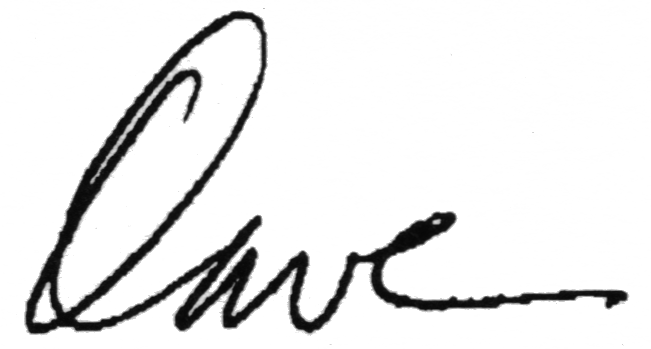
David Schweidenback
Job OpportunityDo you have a good full-time job that fulfills your financial needs but leaves you needing to go work out in the gym? Do you want something more out of your employment than a paycheck, want to make a difference in the world? Pedals for Progress is looking for someone who would be willing to work managing the loading of our international shipping containers 8 to 10 weekends per year. We are active only during the spring and fall so there would be no work in the winter or summer. We need a physically strong young individual who could manage the loading crews through individual leadership. Loading an international shipping container is hard physical work only for 8 to 10 weekends per year. The loading of our shipping containers is the final step in our process and the most important. For every day that you work you would contribute to lifting 450 families out of poverty. Please contact Dave at 908-638-8893 or PD4LS@comcast.net if you have a few Saturday mornings to spare, could use a little more income, and want your efforts to make a positive impact in the world. |
Report from Cameroon, Spring 2018
United Action for Children and Sewing Peace are implementing a One-Girl-One-Sewing-Machine project in the Buea and Mamfe communities. The project aims at promoting entrepreneurial skills to enable young girls and women to create employment. The program targets young girls and women who are just starting as well as those already established in the tailoring business.
The zigzag sewing machine and other accessories sent by SP are very useful as they give the women experience in specialized sewing with different stitches. Some of the women have added new services because of the zigzag machine. The machine is a great favorite because it allows the women to do quick specialized tailoring while avoiding travel to use other machines that are costly and unreliable.
The stories from our beneficiaries are bitter–sweet. Though they earn a living from tailoring, they missed out on life experiences such as interacting with peers, being taken care of, and education. Such is the plight of many young girls from vulnerable families. They are forced to go into the labour market earlier in life to make ends meet. Since formal education is too costly for them, increasing accessibility to vocational skills is a good alternative. Through coaching, mentoring, and other training they can learn skills such as book keeping, costing and pricing, business planning, health and development.
UAC is excited and proud to bring these stories of the beneficiaries of the project.
Juliet Mungwa
My name is Juliet Mungwa and I am 31 years old. I dropped out of school from senior two because my parents didn’t have enough funds to keep me in school. Fortunately I had acquired the tailoring skill from a vocational institute. I was able to borrow a sewing machine from one of our family friends and I started tailoring. I have been tailoring for four years now. My clients, adult women and younger boys. I sew skirts, dresses, blouses and shorts. I earned between 25,000 FCFA (Central African CFA Franc) to 75,000 FCFA a month (U.S. $44 to U.S. $133). Thanks to two additional machines from SP, I am now between 50,000 FCFA and 100,000 FCFA (U.S. $89–$178). From this I am able to save 10,000 FCFA (U.S. $18) for myself, and I spend the rest on taking care of my 3 siblings since my mother cannot afford to take care of the family.
Loveline Aben
I am a 27-year-old single mother of five. Before the UAC/SP project I did not have enough money to buy the machines I needed to meet the demands of my customers. Because of donated machines from SP, I was able to increase the number of machines in my shop and keep up with demand. Thanks to the new machines, my income has increased and I am able to expand my shop and easily pay for food, health care, and the education of my children. I also reinvest part of my profits into the business to acquire working material. I get my orders from parents who bring the uniforms of their children. The photo shows some of the uniforms I tailored for a primary school.
My plan for the future is to get tenders from at least 3 schools to make uniforms. In that way I will have a stable clientele. I also want to get a new location in the trading centre where I can station my business to attract more clients. I hope to get some training in business planning, where my knowledge is limited. I am so grateful for the support given to us through the One-Girl-One-Sewing-Machine project.
Margaret Oyere
I am 35 years old and a mother of five children living in Bolifamba village community. After I completed my training, my husband, who is a subsistence farmer, bought me a manual sewing machine, which enabled me to establish a business as a seamstress in our community. I can now manage to work independently and save my own personal income instead of relying on my husband for daily and other needs. I am now able to assist my husband in the education of our children and taking care of their health.
Thanks to the donation of an electric sewing machine from SP through UAC, I can now promptly tailor modern dresses and all types of local casual/occasional wear for women and children. The machine has helped to boost my earnings and image before my customers. I now earn U.S. $35 per day without strain as compared to $25 before the new machine from SP. I am becoming a self-reliant, independent income earner.
P4P would like to thank the Clif Bar Family Foundation for their continuing support, that support allowed P4P to pay for the shipping costs of the first shipment of bicycles for our new program in Cameroon.
New Collection Partner: Habitat for Humanity, Warren County, New Jersey
Pedals for Progress is proud to announce a unique new collection partner: Habitat for Humanity of Warren County New Jersey. The partnership is due to Daryl Detrick of the computer science faculty at Warren Hills Regional High School (WH) in Warren, New Jersey. Daryl is also director of the WH Chess Club. He and his students have been volunteering at both Habitat for Humanity and Pedals for Progress for the last few years.
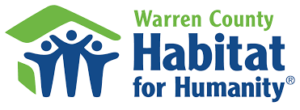
For the past several years, the Chess Club has gotten a number of bicycles from Habitat for Humanity for their annual Pedals for Progress bicycle collection. Habitat for Humanity has been collecting more bicycles than they can sell. P4P’s challenge is to get a minimum $10 donation with each bicycle and sewing machine; this donation is a fundamental part of our business model. To pick up a bicycle or sewing machine, prepare it for shipping, truck it to the warehouse, and pack it away in the warehouse so that is ready to be shipped, we spend an average of $20. Every time someone donates a bicycle or sewing machine with $10 we still need to independently raise another $10. We refuse a lot of bikes that don’t come with money — it is better to collect perhaps fewer and stay in business than collect a whole bunch and be bankrupt.
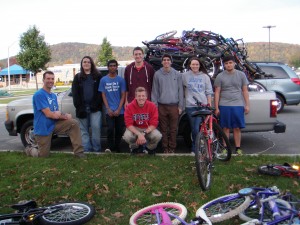 In 2018 Daryl got into a conversation with the Habitat county director Ben Eskow. Daryl mentioned that he might have to take fewer bikes because he was having trouble raising the $10 per bike that Pedals for Progress needs just stay in business.
In 2018 Daryl got into a conversation with the Habitat county director Ben Eskow. Daryl mentioned that he might have to take fewer bikes because he was having trouble raising the $10 per bike that Pedals for Progress needs just stay in business.
Ben met with his staff and board at Habitat for Humanity. They were keenly aware that they were receiving many many more bicycles and sewing machines than their resale store could possibly use. Habitat for Humanity also has some discretionary funding that they can use for international programs. The board of Habitat for Humanity of Washington County decided that they would contribute the $10 per bike and sewing machine to Pedals for Progress and Sewing Peace. Therefore P4P/SP will now be able to pick up their extra bikes and sewing machines on a regular basis.
This is a wonderful collaboration between two institutions searching for a way to help the poor have a better life. Pedals for Progress has a new source of bicycles, which we hope may produce up to 250 bikes this first year. From the perspective of Habitat for Humanity, they have a volume problem and they have found a way to solve it within their mandate by partnering with Pedals for Progress and Sewing Peace. Win-win for the betterment of all.
New Partner in Kenya: Aid the Needy
By Tom Ademba
Spring 2018
Aid the Needy is a community-based organization registered by the Ministry of Social Services operating in Rachuonyo South Sub-County, Homa-Bay County in Kenya. It was started in 2007 through initiatives of local young people to spearhead development among unemployed young people. The organization has transformed lives through sustainable small-scale self-help initiatives. To help young people start their own businesses, we give them vocational skills, including training in sewing, masonry, and carpentry.
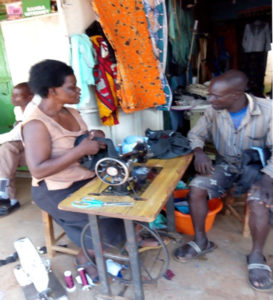
Vision: A community where all are empowered to prosper and lead dignified lives through self-help initiatives.
Objectives:
- To build, equip, and manage a community training centre for young, underprivileged community members to acquire vocational training.
- To train and educate young people out of school, with a special focus on young women, in skills that would enable them to be self reliant.
- To improve the quality of life in the poverty-stricken villages, taking into consideration the cultural context and issues that hinder women from realizing their economic power and potential.
- To stimulate and strengthen community groups, to help them develop income-generating activities, and to enable them to fight stigma and prejudice.
Some of our achievements:
- Since inception, the organization has trained many young people, including disabled youths, in vocational skills and enabled them to start their own businesses.
- With funds from Aidlink Ireland, we launched a micro-enterprise project to support small-scale farmers.
- We received funding from World Mercy Fund Austria to educate young farmers on the agricultural value-added chain so they can earn more income.
- We have recently approached Pedals for Progress to support our community with sewing machines. P4P shipped 72 electric sewing machines to support our training programs and help young people start income-generating projects.
We are grateful to all our partners and in this year we pay our sincere gratitude to Pedals For Progress for the way they fast-tracked the shipment of the sewing machines to support our community project.
P4P thanks the William and Helen Mazer foundation for their continued support and interest in the development of East Africa and for aiding in the cost of shipping 72 sewing machines to Kenya.
New Partner: GoBike Kosovo
By Kushtrim Gojani
Spring 2018
GoBike LLC is located in Pristina, the capital of Kosovo, Europe’s youngest country. Kosovo is a landlocked country bordering Albania, Montenegro, Serbia and Macedonia. Kosovo owes its independence largely to U.S., U.K. and other European partners who intervened in 1999 to stop ethnic cleansing of the Kosovo Albanian majority by the policies of Slobodan Milosevic, the President of ex-Yugoslavia. NATO troops are still present in Kosovo, and the U.S. Army has a base in Kosovo, Camp Bondsteel, which can hold up to 7000 soldiers.
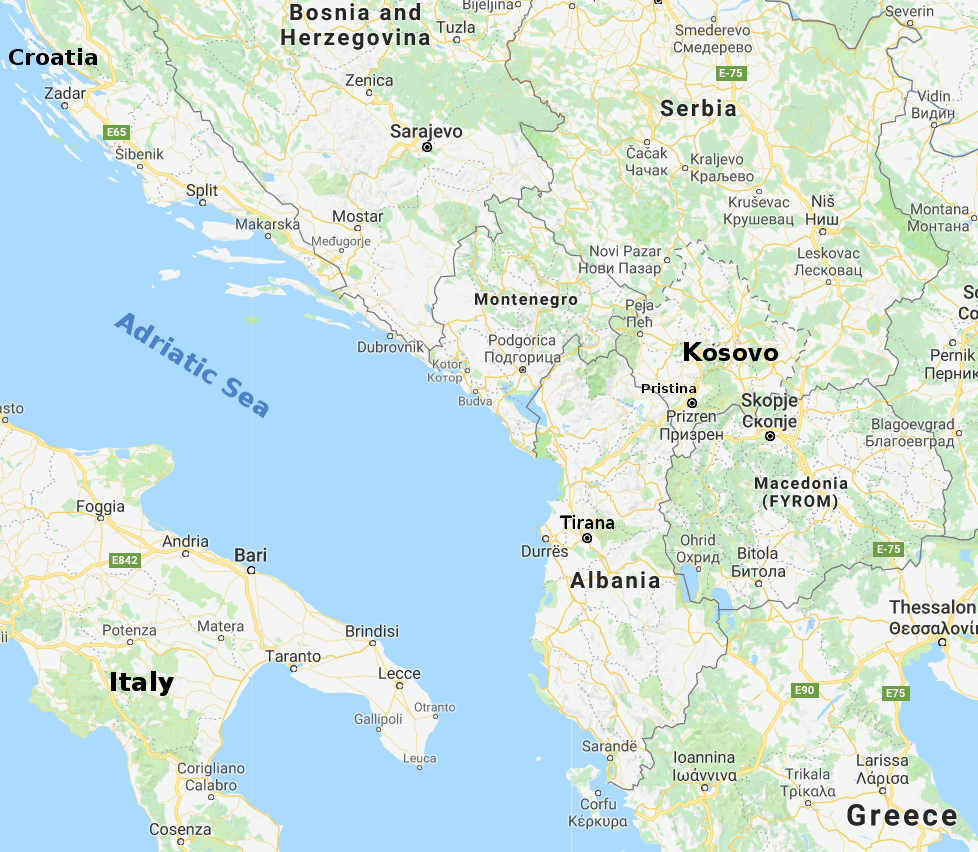
The partnership between Kosovo and the U.S. is strategic. Kosovars are extremely grateful towards the U.S. for its continued support, and Kosovar Albanians (more than 90% of Kosovo’s population) tend to be very friendly towards the U.S. This gratitude is visible across Kosovo’s cities, but most notably in Pristina, where one can walk down Bill Clinton Boulevard, turn onto George Bush Street, and end up in Madeleine Albright Hall.
Like all post-war countries, Kosovo faces many political, economic, environmental and social challenges. Although it has the youngest population in Europe (more than 60% are below 25 years old), the unemployment rate remains at 30%, and at around 60% for youth and women. Kosovo is entirely reliant on energy produced from lignite, which is extremely polluting and a perennial health hazard. Post-war development and the corruption associated with it have taken a negative toll on the environment; quality of air, water and soil; increased congestion in cities; and deforestation in rural areas. Kosovo’s capital is often ranked one of the most polluted cities on earth.
In response to these problems, I established GoBike LLC in November 2017 with the mission to promote cycling and bicycle use in Kosovo, reduce transport-related carbon footprint, and improve Kosovo cyclists’ well-being. The vision of GoBike is a Kosovo society with an improved quality of life and environment. Partnering with Pedals for Progress has been crucial to getting this start-up business going.
GoBike aims to stimulate bicycle use, increase the number of cyclists in city streets and thus reduce pollution from traffic, and make cycling in Kosovo safer and enjoyable for all. We seek to identify, support, and promote all those who use bicycles as a main mode of transportation, and to lobby for improvements of urban infrastructure for cycling.
GoBike strives to be the number one bicycle provider in Kosovo, with specialized bike shops for rentals, sales, and maintenance. Our business will focus on the organization and promotion of cycling events (excursions, festivals, cycling clubs, etc.) and education of citizens on the importance of bicycle use. This, indirectly, will affect the greater demand for bicycle rental and sale services. In the future, GoBike plans to establish the very first public bicycle rental system, initially in the capital, with the hope of expanding to other cities.
GoBike’s chosen area of focus is not only important in and of itself, but it also has multiple benefits to the environment, contributes to health, and supports Kosovo’s economy and tourism. Kosovars brand themselves as “The Young Europeans”. Hopefully, Pristina and other Kosovo cities will have the cycling infrastructure and attitude towards bikes as other European cities like Copenhagen, Amsterdam, anand London.
Pedals for Progress, thank you ever so much for your contribution and support. I look forward to reporting the details of the concrete contribution our joint endeavor is making to ease Kosovo’s environmental and economic challenges.
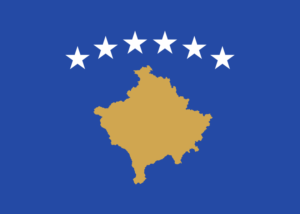
Kosovo
Population: 1,920,079 (2017 est.)
Area: 10,908 sq km (slightly larger than Delaware)
GDP per capita: $12,003 (2017 est.)
New Partner in Peru: Alianza Arkana
By Laura Dev & Techa Beaumont
Spring 2018
Sewing Peace has just received a request for sewing machines for Shipbo artisans in the Peruvian Amazon. [Note: P4P/SP plans to ship sewing machines to Alianza Arkana on 20 June 2018.]
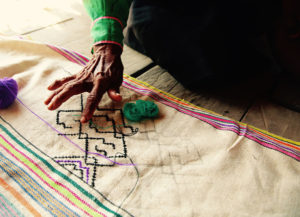
The machines are going to the Non Kene (Our Design) Project of the Pucallpa-based NGO, Alianza Arkana, a small not-for-profit that works with Indigenous Shipibo communities. They have experience facilitating workshops for women and youth, and have close relations with several women artisan groups in both the urban townships of Yarinacocha as well as rural Shipbo villages of Paoyhan, Santa Clara, Betania and San Francisco.
Indigenous Shipibo artisans aspire to improve skills and access a wider market for their products. Our vision is to link maintenance of cultural knowledge and improved livelihoods by developing professional capacity to establish a collective brand, including skills, business and leadership training, new equipment, seed funding, and networking to reach new markets for Shipibo artisans. The provision of sewing machines to these artisans will provide an essential resource to them in meeting these aspirations and improving their income potential.
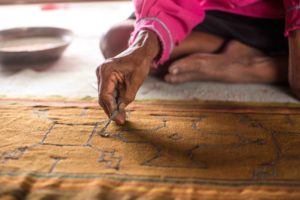
Current Status: In June 2018 we will facilitate the first in a series of several workshops in response to requests by the women artisans in the Shipibo Native community of Paoyhan. Paoyhan is a small village in the Peruvian Amazon, 4–5 hours by boat from the nearest city, Pucallpa. The workshop aims to increase their skills at making clothes, sewing-machine use, and fashion design. Common to many Shipbo artisans whose livelihood is based on selling their wares to foreigners, these women wish to improve their artisanal products and expand their markets in order to meet basic material needs such as food, medicines and education for their children. Over 70% of Indigenous communities in the Amazon live in material poverty and around 30% in extreme material poverty. Traditional artisanal embroidery is an important part of Shipibo culture, and at least 80% of Shipibo households gain income from the sale of these products. However, the artisans here do not have easy access to markets to sell their wares, nor are they trained in using technologies like sewing machines that would enable them to make more complicated types of clothing that can sell for higher prices.
We have partnered with the women-run artesania committee in Paoyhan to plan this workshop, and are bringing in women from the Shipibo Meken artesania collective in Pucallpa, led by Jovita Maynas Bardales, to teach more advanced sewing techniques and fashion design. The goal is to provide training for the Paoyhan women artisans, as well as help build relationships between the rural and urban artisan groups.
Workshop Details: The proposed workshop series has a dual purpose to train participants in clothes-making, and (once acquired) how to use a foot-pedal sewing machine, and will also serve to build community and organizational capacity within and among women artisan groups. By the end of the first 3-day workshop, participants will have learned how to make sewing patterns, and will have made an article of clothing using their newly acquired skills. Ideally, this workshop will be followed by ongoing workshops to learn more advanced skills with sewing machines. We also hope to bring in other fashion-designers, and continue to develop capacities for entrepreneurship, marketing, and product development. These sewing machines will be essential to enable these women to continue to apply the skills learned in the workshop, and ongoing workshops and support will ensure that they have the skills needed to make good use of the machines toward their goals of creating better markets for their wares.
Distribution Strategy for Sewing Machines: Initially we will target participants in the Paoyhan workshop and provide pedal-powered sewing machines to the artesania committee in the village of Paoyhan for their own uses. If we find that current solar energy in the village is sufficient to power electric sewing machines, we will provide these as well. We expect to deliver 15–30 sewing machines to this village depending on availability of electricity.
Following this initial provision of sewing machines, we will plan for further provision of sewing machines to other communities in collaboration with workshops and other events that engage artisans in showcasing and further developing their skills in sewing and fashion design.
Based on the following criteria, sewing machines will be distributed to Shipibo artisans who:
- live in urban townships of Pucallpa or more remote Shipibo villages and have either completed a workshop conducted by the project partners on sewing and fashion design or otherwise have demonstrated existing skills and knowledge of sewing machine techniques
- are not in a financial position to buy their own sewing machine
- will, based on successful participation in a workshop or existing demonstrated skills, be able to utilise the sewing machine to increase their livelihood.
Pricing:
The sewing machines will be provided free of charge to participating artisans. Where artisans or artisan collectives are not in extreme material poverty, they will be asked to make a token contribution of an artisanal product as an indication of their ‘buy-in’ and valuing of the tool provided. Money generated from the sale of the donated artisanal products will be used to fund future workshops.
Report from Albania: A Special Day for Bulqizë Kids and Communities
By the EcoVolis Team
Spring 2018
Bulqizë is an Albanian town about 40 miles northeast of Tirana, the capital. During the Communist era Bulqizë was a mining town well known for the high quality of its chromium and copper. At its peak it was home to around 50,000 people with full employment and excellent infrastructure – including schools, health centers, and roads. Mineral enrichment and smelting factories also provided employment for surrounding rural communities.
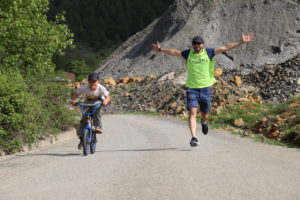
Today Bulqizë has been reduced to an isolated settlement with fewer than 14,000 inhabitants, who still live in the old and decaying Communist-era apartment buildings erected 45 years ago. Unemployment is high and the majority of families live at or below the poverty line. The tragic loss of life of men who work in the mines has left their families with little or no income. Community members and children thus feel financial and other kinds of pressure, and social problems continue to worsen.
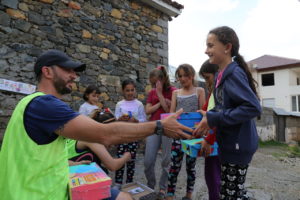 On 1 May 2018, EcoVolis Albania headed to Bulqizë to meet with these communities and donate more than 20 bicycles to the most needy children and families. We also distributed boxes of clothes, toys, books, and modest supplies, providing some much needed relief. EcoVolis activists spent the day in the town talking to people about their lives, hardships, experiences, and daily issues. They also helped children to get on their bikes for the first time in their life, talked to them about their school, dreams, and what it is like growing up in Bulqizë. A local organization joined EcoVolis in this activity, helped us identify the most needy families, and facilitated our interaction with the local community.
On 1 May 2018, EcoVolis Albania headed to Bulqizë to meet with these communities and donate more than 20 bicycles to the most needy children and families. We also distributed boxes of clothes, toys, books, and modest supplies, providing some much needed relief. EcoVolis activists spent the day in the town talking to people about their lives, hardships, experiences, and daily issues. They also helped children to get on their bikes for the first time in their life, talked to them about their school, dreams, and what it is like growing up in Bulqizë. A local organization joined EcoVolis in this activity, helped us identify the most needy families, and facilitated our interaction with the local community.
At the end of the day, our EcoVolis team headed back to Tirana with fond memories of the children and their excitement when they got their new bikes. At the same time, we realize how much more support is needed in Bulqizë. With a series of similar activities in other vulnerable communities across Albania, our EcoVolis Team has given people there a happy break in their everyday routines. Though we can’t make a fundamental change in their lives overnight, we can give children the hope that their future can be different from their parents’ and we can inspire them to dream big like their peers elsewhere in Albania and the world.
Report from Guatemala, Spring 2018
[We just got this short note from FIDESMA, our long-time partner in Guatemala.]
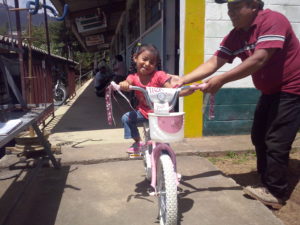
Maria Arecely Reyes Tala is an eight-year-old fourth grader.
She is a girl with dreams. She is a happy, playful little person. She used to see the other girls with their bikes, and was always hoping to have a bicycle of her own. Now she has one.
From the first moment that she got her bike from FIDESMA, she was very eager to learn how to ride it. She learned very fast and now handles the bike very well and rides a little every day. She likes to run errands at the store and ride all around town making mischief.
Pedals for Progress and all their collaborators and volunteers bring smiles to Guatemalan and many other children.
Thanks to P4P for your support, which allows us to offer bikes at prices that everyone can afford.
Our Partners
P4P/SP Active Partnerships as of June 10, 2018 ( 🌐 Map)
ALBANIA, Tirana, PASS, community development: 5,902 bikes (2010 – 2018), 230 sewing machines (2010 – 2018)
CAMEROON, Buea, United Action for Children, youth development: 462 bicycles (2018), 100 sewing machines (2018)
ETHIOPIA, Solar Energy Foundation, small-business training and development: 72 sewing machines (2017)
GUATEMALA, Chimaltenango, Fundacion Integral de Desarrollo Sostenible y Medio Ambiente (FIDESMA), small-business promotion: 9,409 bikes (1999 – 2017), 274 sewing machines (2003 – 2017)
KENYA, Homa Bay, Aid the Needy, community development: 72 sewing machines (2018)
KOSOVO, Kastriot, GoBike, community development: 450 bikes (2018), 50 sewing machines (2018)
PERÚ, Ucayali region, Alianza Arkana, community development, 1st shipment June 20, 2018
TANZANIA, Dar es Salaam, She Can Foundation, community development: 217 sewing machines (2016 – 2017)
UGANDA, Mityana, Mityana Open Troop Foundation, community development: 137 sewing machines (2017)
UGANDA, Iganga, Office of the Mayor, community development: 69 sewing machines (2018)
VIETNAM, Dariu Foundation, Can Tho City, community development, 528 bikes (2018)
Other shipments of bicycles between 1991 and 2018 have gone to non-profit agencies in Appalachia, Colombia, the Dominican Republic, Ecuador, El Salvador, Eritrea, Fiji, Ghana, Haiti, Honduras, India, Madagascar, Malawi, Mexico, Moldova, Mozambique, Namibia, New Guinea, Nicaragua, Pakistan, Panama, Peru, Senegal, Sierra Leone, the Solomon Islands, South Africa, Sri Lanka, Venezuela, and Vietnam, as well as other unlisted groups in Ghana and Nicaragua.
Other shipments of sewing machines between 1999 and 2018 have gone to non-profit agencies in Costa Rica, the Dominican Republic, El Salvador, Georgia, Honduras, Jamaica, Kyrgyzstan, Moldova, Panama, St. Vincent/Grenadines, Sierra Leone, and Yemen as well as other unlisted groups in Cameroon, Guatemala, Kenya, Tanzania, and Uganda.
2015: 3,179 bikes, 310 sewing machines
2016: 2,760 bikes, 285 sewing machines
2017: 3,644 bikes, 533 sewing machines
2018 YTD: 2,431 bikes, 361 sewing machines
Twenty-Seven Year Bicycle Grand Total 154,907
Eighteen Year Sewing Machine Grand Total 4,188
Major Donors
John Alexander & Jane Divinski
AXA Foundation
Biovid
Sherman Carll
CCG Facilities Integration, Inc.
Mrs. Diane Claerbout and Professor Jon Claerbout
Clif Bar Family Foundation
Dariu Foundation
FedEx
Pamela Hanlon Charitable Fund
Jack & Donna Haughn
Robert & Laura Hockett
Leo & Helen Hollein
Elliott & Kathleen Jones
Gary & Mary Kamplain
Dorothy Magers
Helen & William Mazer Foundation
David Schweidenback & Geraldine Taiani
South Brunswick Education Association
Andrew Williams & Emily Winand
Kermit Leslie Young, Jr.
P4P Trustees
John Alexander, Treasurer
UNIT 3230, BOX 470
DPO, AA 34031 – 0470
David Schweidenback, President & CEO
86 E MAIN ST
HIGH BRIDGE, NJ 08829
John Strachan
95 OLD YORK RD
HOPEWELL, PA 18938
Andrew Williams
642 JERSEY AV APT 3
JERSEY CITY, NJ 07303
Robert Zeh, Secretary
5 WOODS EDGE CT
CLINTON, NJ 08809
P4P Staff
Gary Michel, Vice President, gary@p4p.org
Lori Smith, Office Manager, lori@p4p.org (908) 638-4811
Michael Sabrio, Webmaster, michael.sabrio@gmail.com

